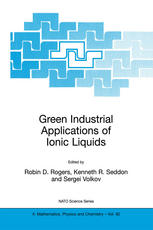

Most ebook files are in PDF format, so you can easily read them using various software such as Foxit Reader or directly on the Google Chrome browser.
Some ebook files are released by publishers in other formats such as .awz, .mobi, .epub, .fb2, etc. You may need to install specific software to read these formats on mobile/PC, such as Calibre.
Please read the tutorial at this link: https://ebookbell.com/faq
We offer FREE conversion to the popular formats you request; however, this may take some time. Therefore, right after payment, please email us, and we will try to provide the service as quickly as possible.
For some exceptional file formats or broken links (if any), please refrain from opening any disputes. Instead, email us first, and we will try to assist within a maximum of 6 hours.
EbookBell Team

5.0
68 reviewsThis book contains the lecture notes for the NATO Advanced Research Workshop on th Green Industrial Applications of Ionic Liquids held April 12th_16 , 2000 in Heraklion, Crete, Greece. This was the fIrst international meeting devoted to research in the area of ionic liquids (salts with melting points below 100 0c), and was intended to explore the promise of ionic liquids as well as to set a research agenda for the fIeld. It was the fIrst international meeting dedicated to the study and application of ionic liquids as solvents, and forty-one scientists and engineers from academia, industry, and government research laboratories (as well as six industry observers and four student assistants) met to discuss the current and future status of the application of ionic liquids to new green industrial technologies. It was immediately clear that the number of organic chemists and engineers working in the fIeld needed to be increased. It was also clear that the declining interest in high temperature molten salts and subsequent increase in low melting ionic liquid solvents had not yet taken hold in Eastern Europe. Participants from NATO Partner Countries contributed signifIcant expertise in high temperature molten salts and were able to take back a new awareness and interest in ionic liquid solvents.